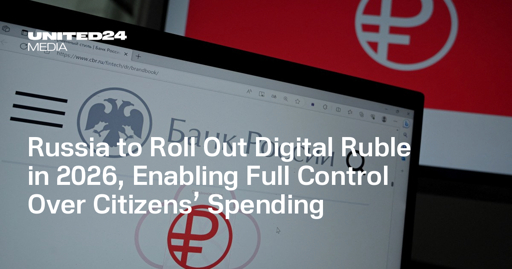[…]
Under draft legislation that the State Duma approvedat first reading on May 22, 2025, a bill will require banks and merchants to facilitate digital ruble transactions and a universal QR payment code for purchases. Beginning October 1, 2025, the digital ruble will be used for a limited range of federal budget expenditures, transitioning on January 1, 2026, to full, unrestricted use for all federal outlays.
[…]
Kremlin financiers will track every digital ruble transaction in real time, granting authorities the power to block citizens’ accounts without a court order and automatically deduct taxes, fines, and other charges. Social benefits payable in digital rubles will be usable only for government‐approved categories of goods and services, and spending may be restrictedbased on a citizen’s place of residence or product type.
[…]
Critics—from human rights groups to economic analysts—argue the digital ruble will entrench state surveillance. According to The Cryptonomist, Russia’s CBDC may replicate China’s model of monitoring every transaction, but with even tighter Kremlin oversight. Ukrainian intelligence observers highlight the risk of a “behavioral loyalty” system, where digital currency access depends on citizens’ political and social “reliability.”
Previously, it was reported that Latvia’s Defense Intelligence and Security Service released a 48-page public handbook designed to help civilians identify and report suspected Russian operatives. The guide details indicators such as ragged appearance and suspicious behavior, offers safe reporting practices, and includes case studies illustrating espionage tactics in both urban and rural settings.
[…]
Can someone with knowledge of these things say, if we would face similar privacy and security issues (from the citizens perspective) with the digital Euro project?
Among the few thing that are clear until we see the final legislation is that there will be two digital euros: the offline and the online version.
With the offline digital euro, you will be able to bump up a digital wallet on your smartphone (or a smart card instead). The offline version’s key feature is that only you and the person who receives the payment will have access to the transaction data, while compliance checks are performed when you load up your wallet (or card) with your bank.
The offline version might have, however, anti-fraud features to prevent forgery. It is said that no private data will be used for these anti-fraud checks, but it is unclear yet how this will be done.
There is also a discussion to introduce a limit a citizen can hold ‘offline’ (this is largely to prevent money laundering, the latest number I read was a limit of EUR 3,000). As everyone can have multiple accounts and multiple wallets, it is also not clear yet how the central bank would link your multiple wallets to your identity to impose this limit without knowing your identity. For now the latest proposal by the central bank mentions “unique identifiers”, but it’s unclear yet how they’d work.
If you pay with the online digital euro, all transaction details will be logged, very much as it is done with current online payment systems. According to the proposal, however, the central bank would only see pseudonymous transaction data, it won’t see your identity. Only your bank has full access to both sets of information. (However, if just a single transaction links your account to your identity, all your transactions are exposed.)
There are a lot of issues to clarify until the final legislation, but as @burgerchurgarr@lemmus.org already said, it depends not in the least what we do in the future. As with everything else, as long as we live in a free society that holds up democratic values, it will likely be fine, but any future government with an autocratic stance could change the law.
Yeah you would. It depends on the exact implementation and luckily with so many countries involved there’s a lot less possibility to get consensus on privacy invasions, but from a technical perspective there’s nothing that stops the EU from later changing what they agreed upon now.
So what this means is that you’ll have to trust the EU that
- they implement this how they say they will
- they won’t later change the system to use it for mass surveillance
A proper replacement for cash is Monero. I know blockchain useless and crypto bad and all but that’s a real private digital currency where you’d have to be wanted by the CIA or Mossad to even face the threat of having your payments tracked.
I imagine the Russian people will come up with a physical shadow currency of some sort or resort to far more bartering.
Black markets in others currencies.
Ah, yeah that makes sense. Or maybe bottlecaps.
Vodka and cigarettes is my guess.
The occasional tracksuit too, I would guess.
Levis
Chervonets?
Seems like the perfect currency for a dictatorship
Eventually they will find a way to seize people’s savings, but maybe they’ll do it in such a way that russians will never know it, because you won’t be able to spend it…




